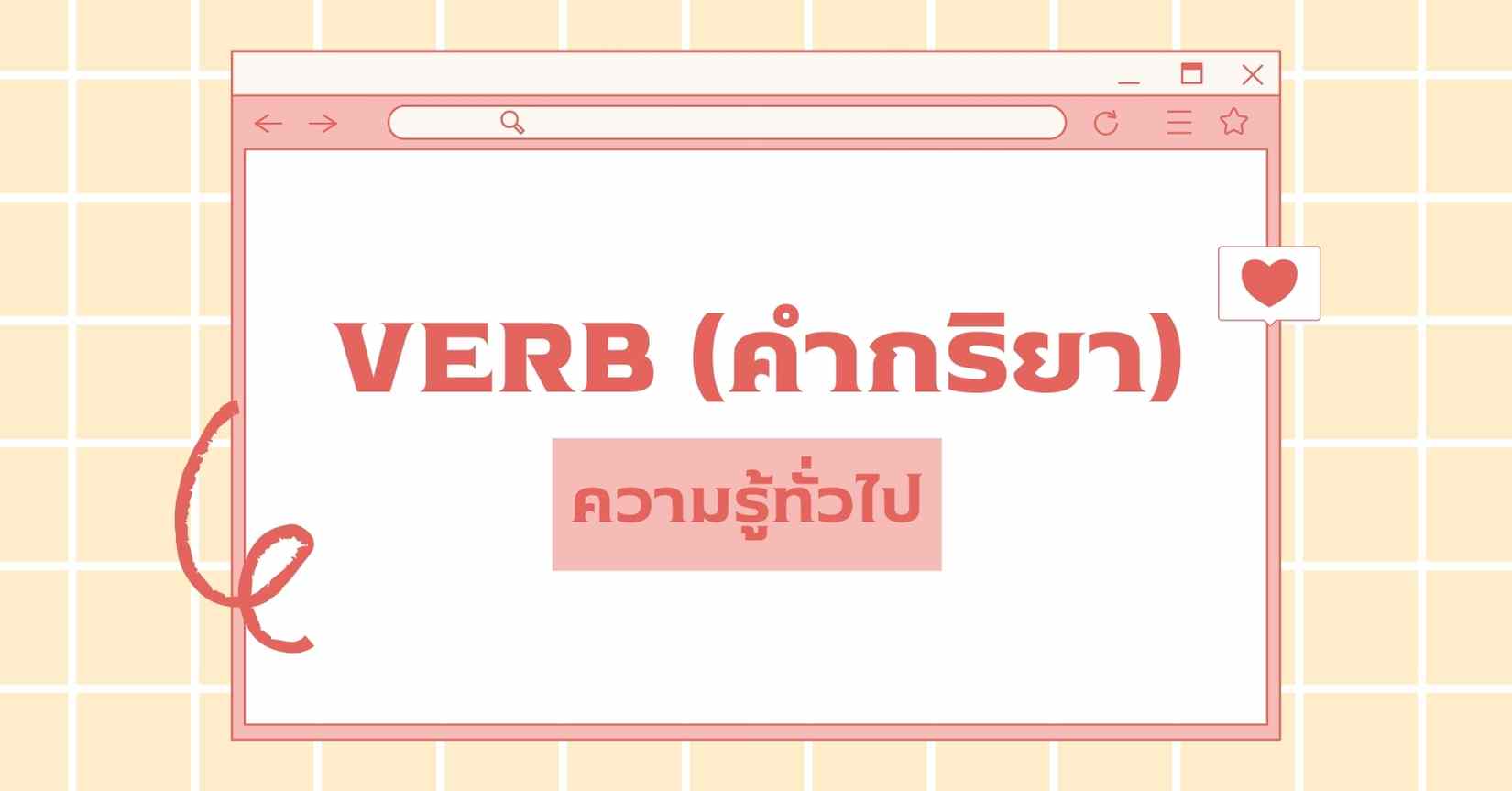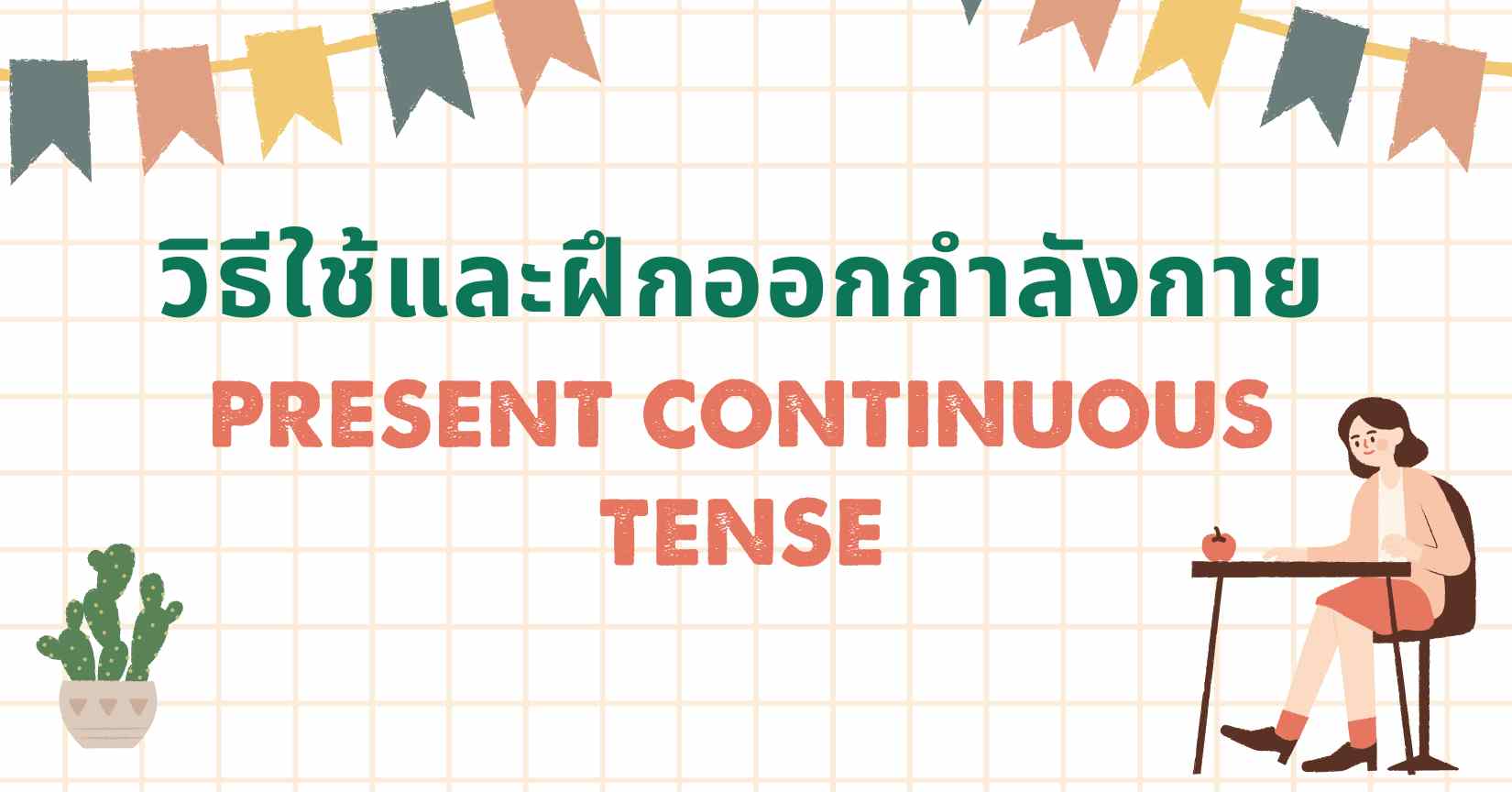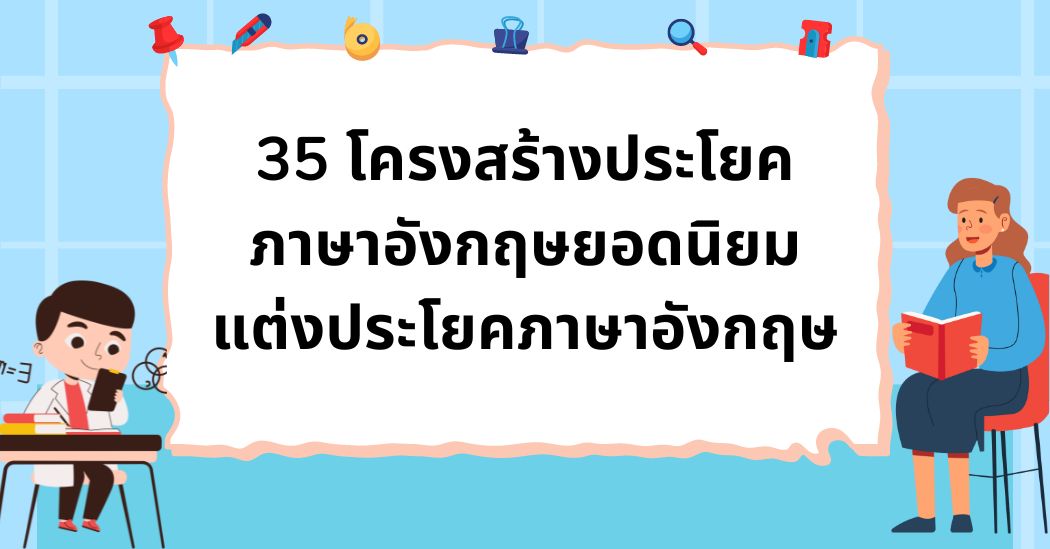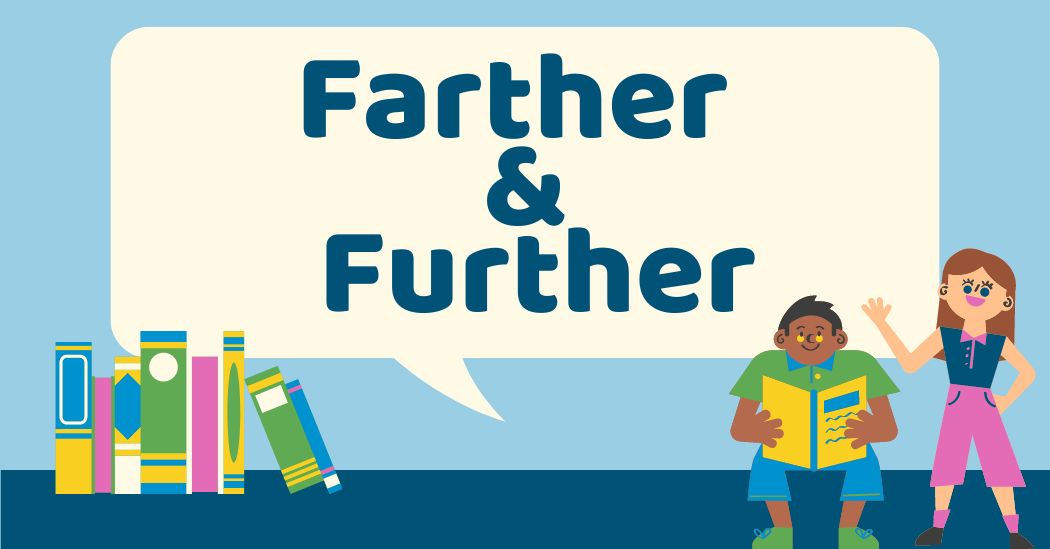คำจำกัดความของคำพูดอ้อม
คำพูดอ้อม (reported speech) ในภาษาอังกฤษเป็นวิธีการถ่ายทอดคำพูดหรือความคิดของคนอื่นโดยไม่ต้องใช้คำพูดโดยตรง (direct speech) แทนที่จะใช้เครื่องหมายอัญประกาศเพื่อแสดงคำพูดเดิม คำพูดอ้อมจะถ่ายทอดใจความหลักของคำพูดนั้นโดยการเปลี่ยนแปลงประกอบบางอย่าง เช่น คำกริยา คำสรรพนาม และเวลา
ตัวอย่างคำพูดโดยตรง (direct speech):
She said: “I am going to the market.” (เธอพูดว่า: “ฉันกำลังจะไปตลาด”)
ตัวอย่างคำพูดอ้อม (reported speech):
She said that she was going to the market. (เธอพูดว่าเธอกำลังจะไปตลาด)
ประเภทของคำพูดอ้อม
ในภาษาอังกฤษ คำพูดอ้อม (reported speech) สามารถแบ่งออกเป็นหลายประเภทขึ้นอยู่กับวิธีการและวัตถุประสงค์ในการถ่ายทอดคำพูดหรือความคิดเห็นของผู้อื่น
1. คำพูดอ้อมของประโยคบอกเล่า (Statements)
ใช้เพื่อถ่ายทอดคำพูดหรือประโยคทั่วไป
ตัวอย่าง:
Direct: “I am hungry,” she said. (ฉันหิว – เธอพูด)
Reported: She said (that) she was hungry. (เธอพูดว่าเธอหิว)
2. คำพูดอ้อมของประโยคคำถาม (Questions)
a. คำถาม Yes/No (Yes/No Questions)
ใช้ “if” หรือ “whether” เมื่อเปลี่ยนคำถาม Yes/No
ตัวอย่าง:
Direct: “Are you coming?” he asked. (คุณจะมาไหม? – เขาถาม)
Reported: He asked if I was coming. (เขาถามว่าฉันจะมาหรือไม่)
b. คำถาม Wh- (Wh- Questions)
ใช้คำถาม Wh- (who, what, where, when, why, how)
ตัวอย่าง:
Direct: “Where do you live?” she asked. (คุณอาศัยอยู่ที่ไหน? – เธอถาม)
Reported: She asked where I lived. (เธอถามว่าฉันอาศัยอยู่ที่ไหน)
3. คำพูดอ้อมของประโยคคำสั่งและขอร้อง (Commands, Requests)
ใช้คำกริยาเช่น “tell,” “ask,” “order,” “advise,” “beg,” ฯลฯ รวมกับคำกริยาในรูป infinitive with “to”
ตัวอย่าง:
Direct: “Close the door,” he said. (ปิดประตู – เขาพูด)
Reported: He told me to close the door. (เขาบอกให้ฉันปิดประตู)
Direct: “Please help me,” she said. (กรุณาช่วยฉันด้วย – เธอพูด)
Reported: She asked me to help her. (เธอขอให้ฉันช่วยเธอ)
4. คำพูดอ้อมของคำแนะนำและข้อเสนอแนะ (Suggestions)
ใช้คำกริยาเช่น “suggest,” “recommend,” “advise,” และโครงสร้างคำกริยาในรูป infinitive with “to” หรืออนุประโยค “that”
ตัวอย่าง:
Direct: “You should see a doctor,” he said. (คุณควรไปหาหมอ – เขาพูด)
Reported: He advised me to see a doctor. (เขาแนะนำให้ฉันไปหาหมอ)
Direct: “Let’s go for a walk,” she suggested. (ไปเดินเล่นกันเถอะ – เธอเสนอ)
Reported: She suggested that we go for a walk. (เธอเสนอให้เราไปเดินเล่น)
การเปลี่ยนแปลงบางอย่างเมื่อเปลี่ยนจากคำพูดโดยตรงเป็นคำพูดอ้อม
การเปลี่ยนแปลงกาลเวลา
Present Simple → Past Simple
Direct: “I play tennis every Sunday,” she said.
Reported: She said (that) she played tennis every Sunday.
Present Continuous → Past Continuous
Direct: “I am reading a book,” he said.
Reported: He said (that) he was reading a book.
Present Perfect → Past Perfect
Direct: “I have finished my homework,” she said.
Reported: She said (that) she had finished her homework.
Present Perfect Continuous → Past Perfect Continuous
Direct: “I have been working here for five years,” he said.
Reported: He said (that) he had been working there for five years.
Past Simple → Past Perfect
Direct: “I saw the movie last night,” she said.
Reported: She said (that) she had seen the movie the night before.
Past Continuous → Past Perfect Continuous
Direct: “I was cooking dinner when you called,” he said.
Reported: He said (that) he had been cooking dinner when I called.
Future Simple → Future in the Past
Direct: “I will travel to Japan next year,” she said.
Reported: She said (that) she would travel to Japan the following year.
Future Continuous → Future Continuous in the Past
Direct: “I will be studying at this time tomorrow,” he said.
Reported: He said (that) he would be studying at that time the next day.
Future Perfect → Future Perfect in the Past
Direct: “I will have finished the project by next week,” she said.
Reported: She said (that) she would have finished the project by the following week.
การเปลี่ยนแปลงคำสรรพนามและคำคุณศัพท์แสดงความเป็นเจ้าของ:
ตัวอย่าง:
“I” → “he/she”, “my” → “his/her”
ตัวอย่าง:
Direct: “I will bring my book,” he said. (“ฉันจะนำหนังสือของฉันมา” – เขาพูด)
Reported: He said that he would bring his book. (เขาพูดว่าเขาจะนำหนังสือของเขามา)
ตัวอย่าง:
Direct: “We are going to visit our grandparents,” they said. (“พวกเราจะไปเยี่ยมปู่ย่าตายายของพวกเรา” – พวกเขาพูด)
Reported: They said that they were going to visit their grandparents. (พวกเขาพูดว่าพวกเขาจะไปเยี่ยมปู่ย่าตายายของพวกเขา)
ตัวอย่าง:
Direct: “She can use my phone,” John said. (“เธอสามารถใช้โทรศัพท์ของฉันได้” – John พูด)
Reported: John said that she could use his phone. (John พูดว่าเธอสามารถใช้โทรศัพท์ของเขาได้)
การเปลี่ยนแปลงคำบ่งบอกเวลาและสถานที่
- “Now” → “then”
- “Today” → “that day”
- “Tomorrow” → “the next day/the following day”
- “Yesterday” → “the day before/the previous day”
- “Here” → “there”
- “This” → “that”
- “These” → “those”
ตัวอย่าง:
Direct: “I need it now,” he said. (ฉันต้องการมันตอนนี้ – เขาพูด)
Reported: He said that he needed it then. (เขาพูดว่าเขาต้องการมันตอนนั้น)
Direct: “We will meet you today,” they said. (พวกเราจะพบคุณวันนี้ – พวกเขาพูด)
Reported: They said that they would meet me that day. (พวกเขาพูดว่าพวกเขาจะพบฉันวันนั้น)
Direct: “I will finish the report tomorrow,” she said. (ฉันจะทำรายงานนี้ให้เสร็จในวันพรุ่งนี้ – เธอพูด)
Reported: She said that she would finish the report the next day (or the following day). (เธอพูดว่าเธอจะทำรายงานนี้ให้เสร็จในวันถัดไป)
Direct: “I saw him yesterday,” she said. (ฉันเห็นเขาเมื่อวานนี้ – เธอพูด)
Reported: She said that she had seen him the day before (or the previous day). (เธอพูดว่าเธอเห็นเขาเมื่อวันก่อน)
Direct: “I will come here,” he said. (ฉันจะมาที่นี่ – เขาพูด)
Reported: He said that he would come there. (เขาพูดว่าเขาจะมาที่นั่น)
Direct: “This is my favorite book,” she said. (นี่คือหนังสือเล่มโปรดของฉัน – เธอพูด)
Reported: She said that that was her favorite book. (เธอพูดว่านั่นคือหนังสือเล่มโปรดของเธอ)
คำแนะนำ (Suggestions)
ใช้ “suggest” หรือ “recommend” + อนุประโยค “that” หรือคำกริยารูป infinitive with “to”
ในบางกรณี “let’s” จะถูกเปลี่ยนเป็น “suggest” + อนุประโยค “that”
ตัวอย่าง:
Direct: “Let’s go out for dinner,” he said. (ออกไปทานอาหารเย็นกันเถอะ – เขาพูด)
Reported: He suggested that we go out for dinner. (เขาแนะนำว่าเราออกไปทานอาหารเย็น)
Direct: “You should see a doctor,” she said. (คุณควรไปหาหมอ – เธอพูด)
Reported: She recommended that I see a doctor. (เธอแนะนำว่าฉันควรไปหาหมอ)
คำพูดอ้อมพิเศษบางประการ
คำอุทาน (Exclamations):
Direct: “What a beautiful day!” – she said. (“ช่างเป็นวันที่สวยงามจริงๆ!” – เธอพูด)
Reported: She exclaimed that it was a beautiful day. (เธออุทานว่าวันวันนั้นเป็นวันที่สวยงาม)
การเสนอและสัญญา (Offers and promises):
Direct: “I will help you with your homework,” he said. (“ฉันจะช่วยคุณทำการบ้าน” – เขาพูด)
Reported: He promised to help me with my homework. (เขาสัญญาว่าเขาจะช่วยฉันทำการบ้าน)
การขอโทษ (Apologies):
Direct: “I’m sorry I broke the vase,” he said. (“ฉันขอโทษที่ทำแจกันแตก” – เขาพูด)
Reported: He apologized for breaking the vase. (เขาขอโทษที่ทำแจกันแตก)
ประโยคเงื่อนไข (Conditionals)
ประโยคเงื่อนไขประเภทที่ 1 (First Conditional):
ใช้เพื่อพูดถึงสถานการณ์ที่อาจเกิดขึ้นในอนาคตหากเงื่อนไขนั้นเป็นจริง เมื่อเปลี่ยนเป็นคำพูดทางอ้อม คำกริยาในทั้งสองส่วนจะถูกเปลี่ยนเป็นอดีต
ตัวอย่าง:
Direct: “If it rains, we will cancel the picnic,” she said. (“ถ้าฝนตก เราจะยกเลิกปิกนิก” – เธอพูด)
Reported: She said that if it rained, they would cancel the picnic. (เธอพูดว่าถ้าฝนตก พวกเขาจะยกเลิกปิกนิก)
ประโยคเงื่อนไขประเภทที่ 2 (Second Conditional):
ใช้เพื่อพูดถึงสถานการณ์ที่ไม่เป็นจริงหรือยากจะเกิดขึ้นในปัจจุบันหรืออนาคต เมื่อเปลี่ยนเป็นคำพูดทางอ้อม คำกริยาในทั้งสองส่วนจะไม่เปลี่ยนแปลง
ตัวอย่าง:
Direct: “If I were rich, I would travel the world,” he said. (“ถ้าฉันรวย ฉันจะเที่ยวรอบโลก” – เขาพูด)
Reported: He said that if he were rich, he would travel the world. (เขาพูดว่าถ้าเขารวย เขาจะเที่ยวรอบโลก)
ประโยคเงื่อนไขประเภทที่ 3 (Third Conditional):
ใช้เพื่อพูดถึงสถานการณ์ที่ไม่เป็นจริงในอดีตและผลลัพธ์ที่ไม่เป็นจริง เมื่อเปลี่ยนเป็นคำพูดทางอ้อม คำกริยาในทั้งสองส่วนจะไม่เปลี่ยนแปลง
ตัวอย่าง:
Direct: “If I had known, I would have told you,” she said. (“ถ้าฉันรู้ ฉันจะบอกคุณ” – เธอพูด)
Reported: She said that if she had known, she would have told me. (เธอพูดว่าถ้าเธอรู้ เธอจะบอกฉัน)
ประโยคเงื่อนไขผสม (Mixed Conditionals):
ใช้เพื่อพูดคุยเกี่ยวกับสถานการณ์ในอดีตที่ส่งผลต่อผลลัพธ์ปัจจุบันหรือในทางกลับกัน
ตัวอย่าง: ประโยคเงื่อนไขผสมประเภทที่ 1 (เงื่อนไขในอดีต ผลลัพธ์ในปัจจุบัน)
Direct: “If I had studied harder, I would be a doctor now,” he said. (“ถ้าฉันเรียนหนักขึ้นในอดีต ตอนนี้ฉันจะเป็นหมอ” – เขาพูด)
Reported: He said that if he had studied harder, he would be a doctor now. (เขาพูดว่าถ้าเขาเรียนหนักขึ้น ตอนนี้เขาจะเป็นหมอ)
ตัวอย่าง: ประโยคเงื่อนไขผสมประเภทที่ 2 (เงื่อนไขในปัจจุบัน ผลลัพธ์ในอดีต)
Direct: “If I were more careful, I wouldn’t have made that mistake,” she said. (“ถ้าฉันระวังมากขึ้น ฉันจะไม่ทำผิดพลาดนั้น” – เธอพูด)
Reported: She said that if she were more careful, she wouldn’t have made that mistake. (เธอพูดว่าถ้าเธอระวังมากขึ้น เธอจะไม่ทำผิดพลาดนั้น)
เรียนรู้คำศัพท์ภาษาอังกฤษอย่างมีประสิทธิภาพกับ MochiVocab
MochiVocab เป็นแอปพลิเคชั่นเรียนคำศัพท์ภาษาอังกฤษที่ใช้วิธี Spaced Repetition ในการวิเคราะห์ประวัติการเรียนรู้ของผู้ใช้เพื่อคำนวณ “ช่วงเวลาทอง” ซึ่งจะแจ้งเตือนให้ผู้ใช้ทบทวนเมื่อสมองกำลังจะลืมความรู้ โดยใช้เวลาเรียนเพียง 10-15 นาทีต่อวัน MochiVocab ช่วยให้ผู้เรียนจดจำคำศัพท์ได้มากถึง 1,000 คำในหนึ่งเดือน ปัจจุบัน
คุณสมบัติที่โดดเด่นที่สุดคือ “ช่วงเวลาทอง” ซึ่งจะคำนวณเวลาที่ผู้ใช้จะลืมคำศัพท์ตามประวัติการเรียนรู้ของผู้ใช้ เมื่อเวลานั้นมาถึง แอปจะแจ้งเตือนทางโทรศัพท์เพื่อให้ผู้ใช้ทบทวนเพื่อเพิ่มประสิทธิภาพในการจำ
จากผลการเรียนของคุณ MochiVocab จะจัดเรียงคำศัพท์ที่คุณได้เรียนรู้ตามระดับความจำ 5 ระดับ คำศัพท์ในระดับที่สูงขึ้นจะมีช่วงเวลาทบทวนที่ยาวนานขึ้น ในทางกลับกัน คำศัพท์ในระดับต่ำจะถูกแจ้งเตือนให้ทบทวนบ่อยขึ้นจนกว่าคุณจะจำได้อย่างแม่นยำ วิธีนี้จะช่วยลดเวลาที่ใช้ในการทบทวนคำศัพท์ที่คุณจำได้แล้ว เพื่อเน้นคำที่ยากและคุณมักจะลืม

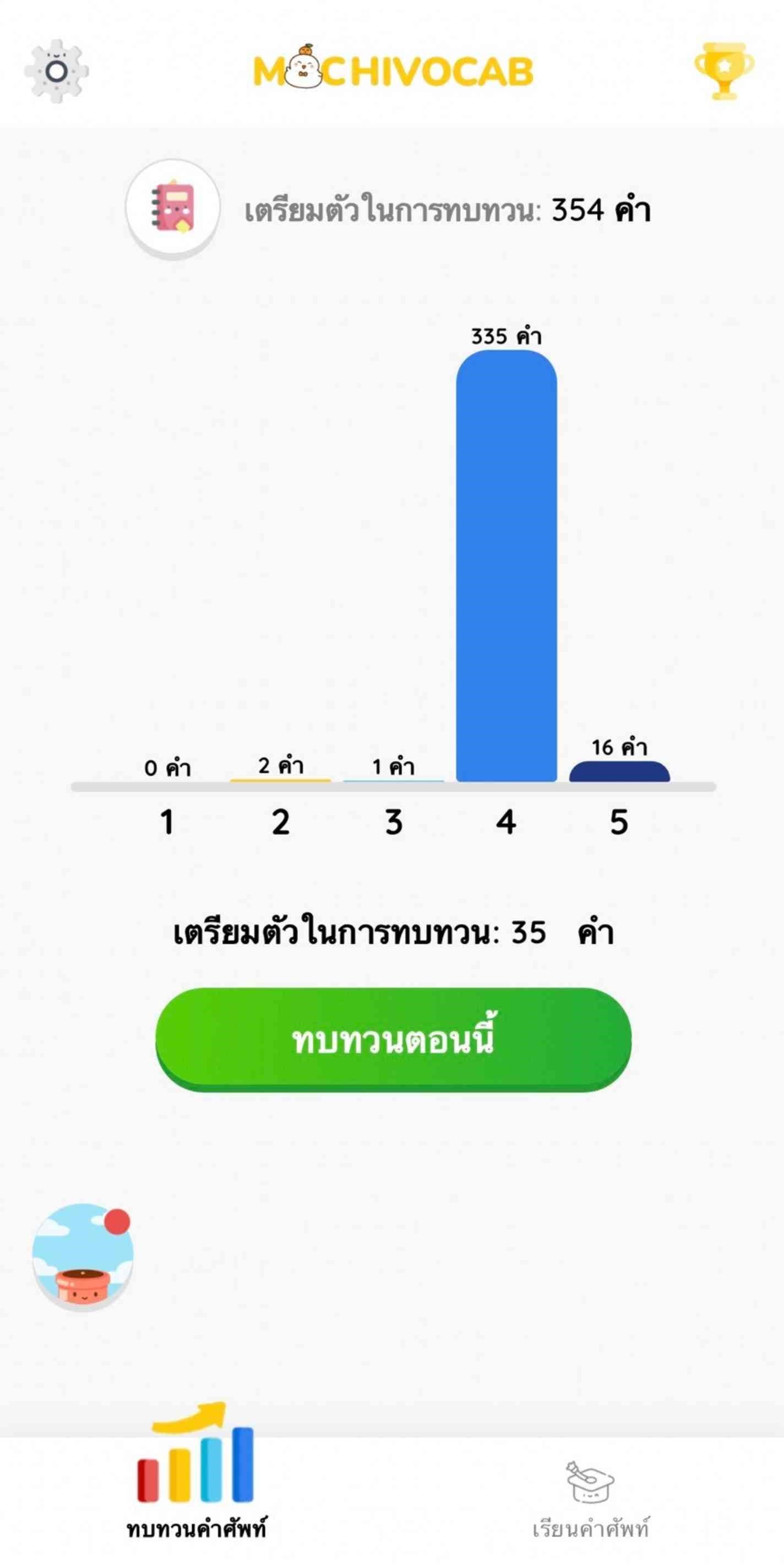
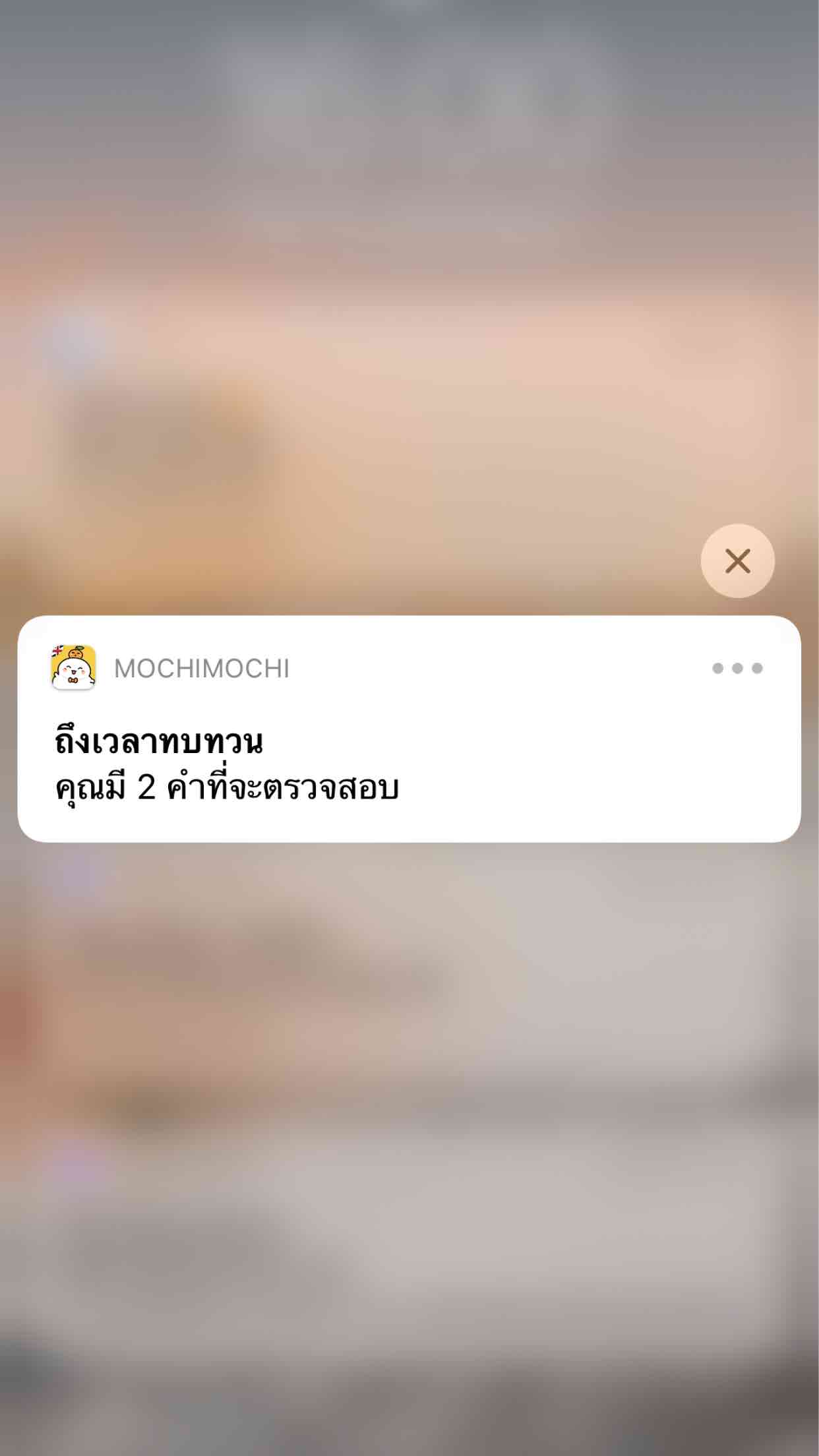
ด้วย MochiVocab การเรียนรู้คำศัพท์จะไม่ใช่ปัญหาในการเรียนภาษาอังกฤษอีกต่อไป มาเริ่มต้นใช้เพื่อปรับปรุงระดับของคุณกันเถอะ

